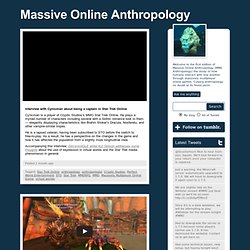

JSTOR: Latin American Research Review, Vol. 48, No. 1 (2013), pp. 174-190. Boellstorff, T., Nardi, B., Pearce, C., Taylor, T.L.: Ethnography and Virtual Worlds: A Handbook of Method. Ethnography and Virtual Worlds is the only book of its kind--a concise, comprehensive, and practical guide for students, teachers, designers, and scholars interested in using ethnographic methods to study online virtual worlds, including both game and nongame environments.

Written by leading ethnographers of virtual worlds, and focusing on the key method of participant observation, the book provides invaluable advice, tips, guidelines, and principles to aid researchers through every stage of a project, from choosing an online fieldsite to writing and publishing the results. Tom Boellstorff is professor of anthropology at the University of California, Irvine. His books include Coming of Age in Second Life: An Anthropologist Explores the Virtually Human. Bonnie Nardi is professor of informatics at the University of California, Irvine. Her books include My Life as a Night Elf Priest: An Anthropological Account of World of Warcraft.
Review: Old stuff in a new virtual world: World of Warcraft funeral Raid and more. In this paper I will try to discuss a particular video posted in Youtube in 2006 where it's shown an online funeral raid in a Massive Multiplayer Online Role Playing Game (MMORPG) called "World of Warcraft" (WOW).

This video was posted by the Guild who performed the raid probably as a way of propaganda and self promotion; but when I start to think about the issue and crossing the information with other videos and readings this paper become something a little different. So I've take that video as central point of discussion and tried to extend the analysis to the use of internet. Before I start it must be clear that in order to understand the dimension and social implications of this game it would take far more theory and text to perform a task so extensive that would not fit for this paper. Chinese gold farming small preview Looking at this we may think that «In the spectacle, which is the image of the ruling economy, the goal is nothing, development is everything» Final consideration. Massive Online Anthropology. A Look at the Great Guild Wars 2 Ectoplasm Bug of May 2013 Not too long ago, Guild Wars 2 had an interesting thing happen to their game – a bug caused a high-level ubiquitous end-game-important crafting item to stop dropping from salvaging items.

Those of you who play GW2 know I’m talking about Globs of Ectoplasm, otherwise known as “ectos.” The bug didn’t last long, but it had some profound effects on the community and economy. The Great Ectoplasm Bug of May 2013 First, let me describe the bug. Essentially the primary place you get ectos is from melting down rare and exotic with salvage kits—which come in various qualities from crude to awesome (i.e. the Black Lion kit)—causing the item to drop between zero and three ectos. The bug, however, caused this drop rate to diminish to almost half that. According to a blog on MiniMaxir written by Max Woolf: Why Game?: An Anthropological, Sociological and Psychological Approach. This post has been edited by the GamesBeat staff.

Opinions by GamesBeat community writers do not necessarily reflect those of the staff. Editor's note: Andrew delves much deeper into the topic of why people play video games than your typical article tackling the subject. Take the time to read the entire thing and you'll have some good ammo the next time your mom/dad/husband/wife/girlfriend/boyfriend gives you grief for playing video games. – Aaron When Robert Ashley put together Episode 3 of A Life Well Wasted and asked the question, "Why game?
" I was left disappointed. With my particular background and interests (an Archaeology Major converted from a Psychology B.Sc four courses short of my degree), I hold the belief that there is always some deeper reason to our behavior. While this article is merely a thought experiment and series of hypothesis, I do hope it will spur discussion and thought on what video game playing actually represents in our society. Fast forward to today. MMORPG Anthropology: Video Games and Morphing Our Discipline.
By Daniel Lende World of Warcraft is a MMORPG.

And what is that, you ask? A massively multiplayer online role-playing game, in this case the most successful one in existence. It is run by Blizzard Entertainment, based on fantasy role-playing (i.e., swords and sorcery), and has more than 9 million subscribers worldwide. These subscribers pay a monthly fee (currently $14.99 if you pay month-to-month) and for that, Blizzard says, “thousands of players adventure together in an enormous, persistent game world, forming friendships, slaying monsters, and engaging in epic quests that can span days or weeks” in the realm of Azeroth. They also piss each other off. In commentary on the clip at the reactions can be divided into two basic types: “i loved it . laughed hard. i got the high quality video burned to dvd” versus “If you haven’t got enough common decency to leave some people alone to be sad about their friends death then your pretty pathetic.”
Anthropology and Video Games - Series.